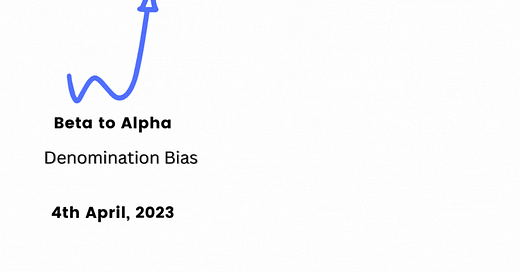As India keeps formalising, the usage of credit and debit cards is all set to Zoom - apart from the blitzscaling seen in UPI.
You may not think twice before swiping because of a deeply embedded cognitive bias.
Allow me to introduce you to denomination bias.
There are multiple cognitive biases all around us? Before I get to denomination bias, let's understand what a cognitive bias is in the first place.
You see, on a daily basis we may actively try and take decisions but a lot of times there are blindspots.
These biases are all around us and come in multiple shapes and forms.
Let's say you tried cooking an omelette and ended up burning it.
The next time you try and cook, this will haunt you like anything.
This is often the same case with investing.
A stock goes up - you will think it will go up further.
A stock goes down - you will think it will keep going down.
One can also take an opposite view, but more on that later.
This is nothing but what is commonly called an 'Anchoring Bias'.
Wherein we try and focus on the most recent event and 'anchor' ourselves to thinking that the same is going to be the foundational layer of future events.
Now let me present an extreme example.
At this point you're probably thinking - sounds fair, right?
Well, that's like saying - I know someone who got into a car accident, so driving a car is unsafe.
Or, just because there was a recent plane crash, getting on a plane is unsafe.
Now that we have broken down one bias, let us jump into denomination bias (DB).
So what the hell is DB?
Let's think of a pre-plastic money (debit, credit cards etc.) and pre-UPI / QR era.
Let's say you have 500 rupees in your pocket.
Now on this, there are two scenarios -
Scenario A - 1 500 rupee note
Scenario B - 5 100 rupee notes
If your answer is B, you are absolutely correct.
It is easy to keep taking 100 rupee notes out multiple times and spend money - compared to trying to get your 500 rupee note 'changed' for a transaction.
These ladies and gentlemen is what DB is all about.
DB is actually a positive cognitive bias that helps you ration your spending - not make you end up spend a lot of money and at the same time ensure you act rationally.
The moment you remove hard cash from the equation something truly magical happens.
DB or Denomination Bias gets thrown out of the window!
You don't think twice before you spend 599 or 799. You have to get a mobile cover for your phone, you will hard bargain while buying in cash to save 50 rupees.
Ordering online - 799 ka maal 599 me, BUY!
Today 60% of the US population owns a credit card. What's the total outstanding?
~USD 800 bn dollars.
Now, when you look at this number in seclusion, it may give you a sense that it is so huge, people are dumb etc.
Let's do some math now. At ~USD 72,000 GDP/Capita with 350 mn household, we arrive at USD 25 tn size of the economy. In reality, this number is ~USD 18-19tn. Credit Card Debt as a % of GDP then becomes a measly 4%.
So what is the insight? Well, next time when you want to buy something, think whether you will be able to buy it without your credit card. Stick to a golden rule - Can I buy this twice with the money I have? This can give you a lot of answers!
What is the investing implication?
Well, if e-commerce was the buzz word between 2010 and 2020, BNPL is going to be the craze between 2020 & 2030. As DB gets thrown out of the window, there will be a massive 'structural shift' in the way people spend money.
This change has already played out to a great extent - call it capitalism, consumerism what have you. Apart from first order thinking, look out for derivative plays.
For instance - if e-commerce is something that excites you and doesn't look investible, look for logistic companies. If you can't find investible BNPL companies, try finding collection agencies etc. Be cognisant of the industry profit pools.




